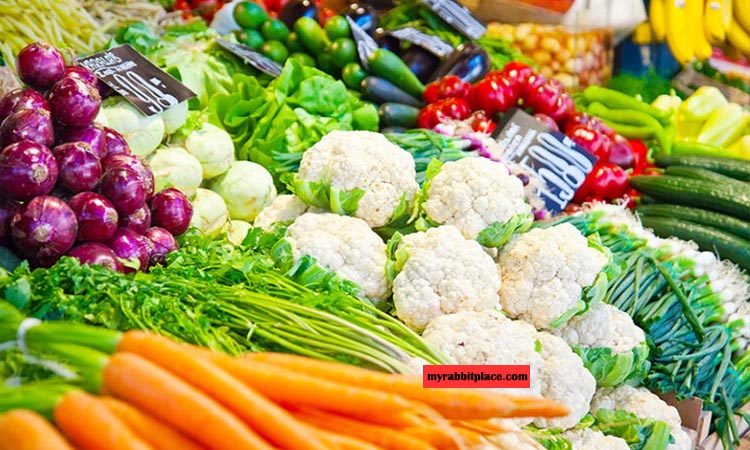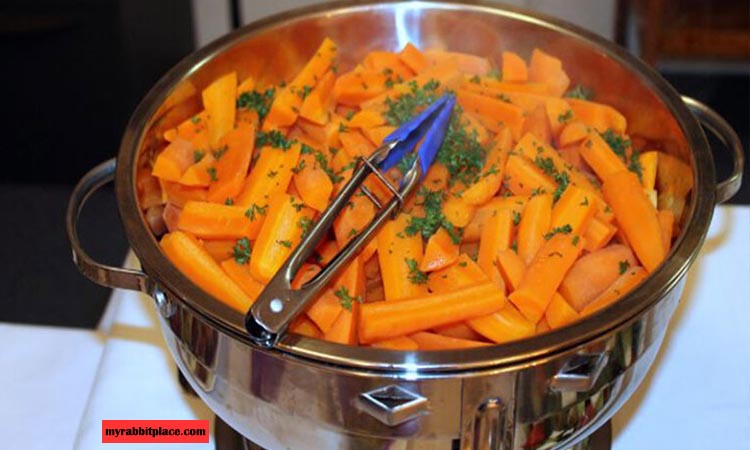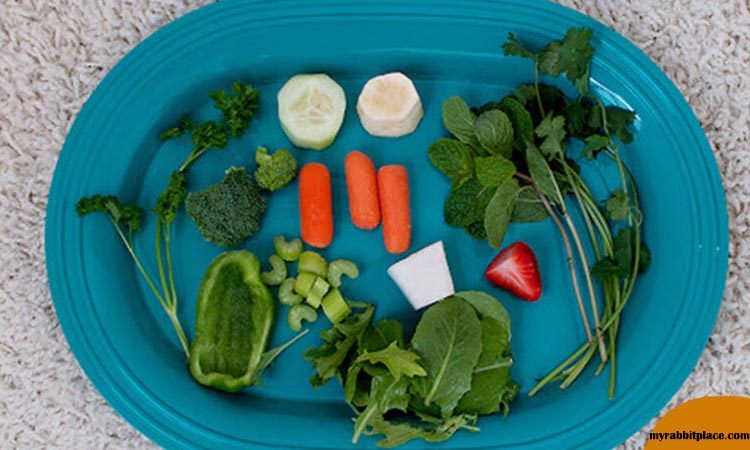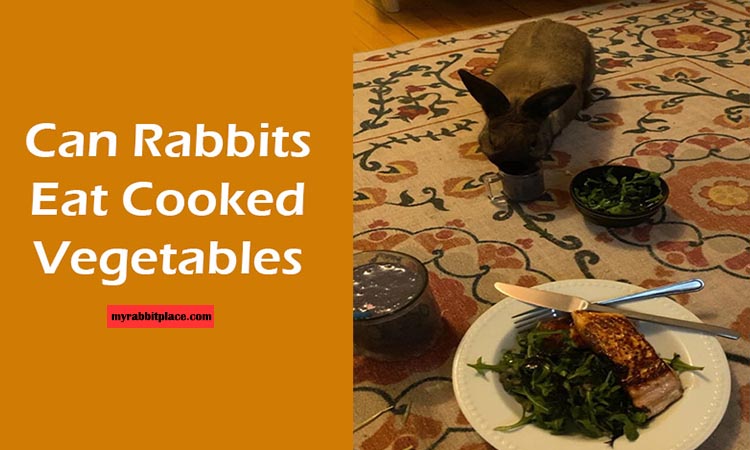Rabbits are darling creatures, cuddly and furry with cute wiggling nostrils and velvety ears; they have a special place in our affections. They are naturally herbivorous creatures which grow on fresh greens and vegetables.
These tiny animals that eat only green plants have digestion systems that are especially suited to the fibrous goodness of raw plants. But what about cooked vegetables? Can rabbits enjoy the same veggies we savor on our plates after they have been cooked?
We will be learning today about rabbits’ diets and also finding out if it is safe for them to include cooked vegetables in their meals. So, Can Rabbits Eat Cooked Vegetables? Let’s find out from this blog post. Visit our Home Page for more rabbit feeding tips and care guides.
Understanding the Rabbit Diet
Rabbits have very specialized digestive systems that are adapted to a diet consisting mostly of tough plant material. In the wild, these herbivores graze on grasses, bite into leaves and occasionally nibble at twigs or bark.
Fiber is important in the diet of rabbits because it helps to naturally wear down their teeth as well as keeping them healthy inside the gut. They have always had a preference for fibrous foods like grass and leaves when they lived in the wild, munching away on plants all the time. Thus, it is essential to give them food containing plenty of fiber for their well-being.
The basics about rabbit diets help one understand dietary requirements that should be considered whenever one wants to add new components such as cooked vegetables to everyday meals.
You can also read - Can Rabbits eat Sunflower Seeds?
Importance of Raw Veggies
Rabbits love feasting on raw vegetables that are important in their diet. This is true for different fresh vegetables which add taste and promote health in general.

Because of its nutrient contents, rabbits need some leafy greens such as kale, spinach and romaine lettuce and other veggies like carrots and bell peppers. These fresh foods not only make rabbits’ meals interesting but also keep them healthy.
These fresh delights are packed with vitamins together with minerals thus offering a tasty as well as nutritious range that matches rabbits’ nutritional requirements, enabling them to survive on a diet that mirrors what they naturally prefer and encourages happy living.
Can rabbits eat cooked vegetables?
Let us tackle this question, it is believed that raw veggies are very healthy and safe, but the introduction of heat into a rabbit’s diet changes everything.
Making a rabbit to eat raw vegetables is good but once they have been cooked, it causes many nutritional concerns. In turn, this brings us to an essential point where knowing about how cooking affects different types of vegetables becomes necessary in ascertaining if it would change into a savory ingredient for a rabbit’s meal or not.
Through unraveling the complexity surrounding rabbit nutrition with regard to cooked vegetables; we aim at illuminating the factors by which people who look after rabbits must consider when thinking of such culinary variation regarding their best friends.
Pros and Cons of Cooked Vegetables
Pros
Enhanced Nutrient Absorption
Cooking can improve nutrient uptake in rabbits through the disintegration of cell walls in vegetables. This could enable more nutrients to be taken up by the digestive system of a rabbit.
Although rabbits have specialized adaptations for extracting nutrients from cellulose plant materials such as cooking can assist with the decomposition of tougher plant structures thus unlocking additional nutritional benefits. Understanding this is vital in evaluating if cooked vegetables would offer increased availability of nutrients to rabbits.
However, there should be caution because too much cooking may result in nutrient loss. Hence, considering the best methods and durations for which particular vegetable recipes are prepared is important to tap into the benefits while keeping up its nutritional value as it affects a rabbit’s diet.
Softer Texture
The consequence could be that cooked vegetables, which are smooth in nature, might help bunnies with dental problems or older rabbits. So, it is easier to chew and digest for rabbits that have problems with their teeth or if they are old.
Cooking softens the texture of vegetables making them palatable for most rabbits that may be suffering from dental issues. This is especially important because oral health contributes significantly to a rabbit’s total wellness.
This helps to make the meal more comfortable for such rabbits, for example, those with special dental needs through a change of consistency in cooking vegetables. However, care must be taken when introducing these cooked foods as they should match the individual requirements and preferences of a particular rabbit.

Cons
Loss of Nutrients
While boiling greens may have some advantages it also has its own demerits. Loss of essential vitamins and minerals that are good for rabbits is a probable loss associated with cooking. Through the process of heating, certain vulnerable nutrients get broken down thus reducing their general amounts.
In this regard, vegetable’s nutritional value is very critical to rabbits. Some cooking methods improve nutrient assimilation while decreasing the food’s nutritive value.
Thus, an even-handed perspective is crucial, considering both the positive and negative implications of cooking vegetables for rabbits. You must be careful not to compromise the vital nutrients necessary for your rabbit’s optimal health during the process of cooking by maintaining a balance.
Potential for Harmful Additives
In the case of cooked vegetables for rabbits, there is a likelihood of harmful additives. When seasoned with common ingredients used in cooking for humans such as oils or seasonings, vegetables can be harmful and risk the health of the rabbits.
The rabbits possess sensitive digestive systems and some components like salt, spices or oil may be dangerous to them or even poisonous. The same herbs that we find so delicious in our meals might upset your rabbit’s tummy or make it very sick. Regarding this information when preparing cooked vegetables for your rabbit is important.
Choosing simple cooking techniques devoid of flavors guarantees that bunnies receive a healthy and safe addition to their diet without any risks associated with the use of additional substances. Rabbits need close attention to avoid unintended harm while providing them with a healthy culinary experience through proper consideration during cooking concerning processes and ingredients used.
Also Read this Article - Can a Rabbit eat Dog Food?
Safe Cooked Vegetables for Rabbits
When considering feeding your rabbit with cooked veggies, it is important to choose safe options that will also be beneficial to the animal.
Leafy Greens
When it comes to rabbits’ leafy greens, cooked and unseasoned ones can be eaten a little. Leafy greens like spinach, kale and Swiss chard preserve their nutritional value even when cooked without additives.
While cooking may make them softer and hence more likely to be liked by some rabbits, one needs to ensure that cooking is plain and does not incorporate harmful seasoning or oils. These are the types of cooked leafy greens that contribute towards dietary diversity in rabbits since they provide a variety of necessary vitamins and minerals.
Nevertheless, moderation is vital because an excessive intake of any food (even healthy ones) can disrupt a rabbit’s gentle digestive balance. Carefully watching individual preferences and responses is therefore important as these cooked leafy greens are being introduced.

Root Vegetables
Carrots and sweet potatoes are root vegetables that when cooked without any additives make an excellent tasty and nutritious addition to a rabbit’s diet. Cooking these vegetables actually makes them taste better and a bit softer thus more manageable by rabbits thus making it easier for the rabbits, particularly those with dental issues.
Due to their naturally sweet taste, many rabbits like carrots very much. In cooking these roots for rabbits, it is important to avoid seasoning or using oil or other things that could disrupt their delicate digestive systems. Instead, use simple cooking techniques that retain the nutrients inherent in these foods.
Occasionally introduce cooked carrots and sweet potatoes into a bunny’s diet for some variety in taste which can add something different to meals while providing everything necessary to meet their dietary needs. With all new foodstuffs given to rabbits watch closely how each reacts individually so as to come up with individualized diets for them.
Unsafe Cooked Vegetables for Rabbits
Certain cooked vegetables should be strictly avoided due to potential harm to rabbits.
Cooked Nightshades
When feeding a rabbit, it is necessary to be careful about giving it nightshades such as tomatoes, peppers and eggplants that have been cooked. These are veggies from the nightshade family that are likely to be toxic when prepared and taken by rabbits. In certain amounts, nightshades do contain compounds like solanine and tomatine that can be poisonous to rabbits.
These harmful substances may still persist even after cooking these vegetables which therefore puts a rabbit’s health at risk. Consequently, it’s better advised not to give cooked nightshades of any kind because they can cause bad reactions or poisoning.
For either raw or cooked ones, nightshade vegetables in whatever form must be kept away from your rabbit in favor of safer options that are consistent with the exclusive dietary requirements of rabbits. To avoid possible problems with the health of your bunny you have first consult with the vet before adding anything new into his diet plan.
Seasoned or Spiced Vegetables
When considering adding some cooked vegetables to the rabbit’s diet, beware of seasoned ones with salt, garlic, onions or any other spices. These can be harmful to the sensitive digestive systems of rabbits.
Salt may upset the balance of electrolytes in a rabbit’s body system hence making it too high or too low. Compounds found in garlic and onions may lead to stomach problems or even more serious health issues for rabbits. Further, spices commonly used in human cooking can be damaging to a rabbit’s welfare.
To ensure that rabbits are safe and healthy, plain unseasoned boiled vegetables should be given. This way there is no chance of introducing dangerous substances into a delicate digestion process of the rabbit thereby allowing them have secure and wholesome eating habits.
Cooked vegetable meals for your bunnies should follow a simple approach aimed at their wellness.
FAQ
Can rabbits eat cooked vegetables?
Yes, cooked vegetables are good for rabbits but caution should be taken. Cooking can change the texture and nutrient availability of vegetables. They should be introduced gradually in small bits without any seasoning, salt, garlic, onions or additives. For example, leafy greens, carrots and sweet potatoes may be offered sparingly when cooked.
Can rabbits eat some vegetables which they should not even when cooked?
Yes, there are particular vegetables, especially those of the nightshade family like tomatoes, peppers and eggplants, which should be avoided even if prepared. They contain a harmful compound that is sometimes not completely removed through cooking. Besides, any flavored or spiced veggies more so with salt, garlic, and onions among other spices need to be kept from rabbits because their digestive systems do not handle such.
For what reasons is a high-fiber diet important for rabbits?
Rabbits have a peculiar digestive system that necessitates them to feed on a high fiber diet. It helps in wearing down continuously growing teeth and maintaining a healthy gut tract. In the wilderness, they naturally eat grasses, leaves and occasionally barks or twigs hence emphasizing how essential fibrous foods are.
Are there any benefits to cooking vegetables for rabbits?
Sometimes cooking can lead to the disintegration of vegetable cell walls leading to higher chances of absorbing certain nutrients by cells. To old bunnies or those with dental problems, chewing raw vegetables may pose challenges thus making them prefer cooked ones. Nevertheless, it is necessary to weigh these potential merits against the loss of some vitamins and minerals due to the cooking process.
Can rabbits eat seasoned or spiced vegetables?
Rabbits should avoid any vegetables that have been seasoned with anything. Most seasonings such as salt, garlic, onions or other well-known spices in human cookery can be harmful to rabbits or even toxic. In order to ensure their safety, offer simply cooked plain vegetables.
What are the signs that I should look for when introducing my rabbit’s diet to cooked vegetables?
Your rabbit is a good indicator of how it reacts to change including the introduction of cooked vegetables into its diet. Indicators of positive responses include shows of enthusiasm around food, healthy digestion and strong energy levels. If you see negative responses such as an upset stomach or a lackadaisical approach toward life seek medical assistance from your vet.
Conclusion
Sometimes, in your rabbit’s diet, you can eat a little bit of some cooked vegetables that become treats occasionally and are supplementary to its fresh and raw vegetable-based nutrition. Nevertheless, one should also stay away from vegetables that have been seasoned or spiced up.
Rabbit’s nutritional needs must come first hence when introducing new foodstuffs, it is necessary to consult with a veterinarian for guidance. A well-fed and happy rabbit will always be provided with a carefully constructed diet that acknowledges their individual dietary requirements and likes.


